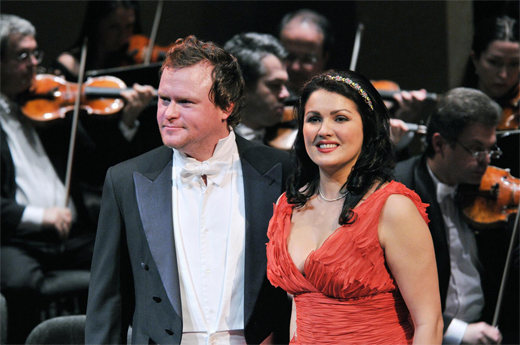 Spain P.I. Tchaikovsky, Iolanta: Soloists, Mariinsky Symphony Orchestra and Chorus, Valery Gergiev (conductor), Gran Teatre del Liceu, Barcelona, 10.1.2013 (JMI)
Spain P.I. Tchaikovsky, Iolanta: Soloists, Mariinsky Symphony Orchestra and Chorus, Valery Gergiev (conductor), Gran Teatre del Liceu, Barcelona, 10.1.2013 (JMI)
Concert Version
Cast
Iolanta: Anna Netrebko
Vaudemont: Sergei Skorokhodov
King René: Sergei Aleksashkin
Robert: Alexander Gergalov
Ibn-Hakia: Edem Umerov
Almeric: Andrei Zorin
Bertrand: Yuri Vorobiev
Marta: Natalia Yevstafieva
Brigitta: Eleonora Vindau
Laura: Anna Kiknadze

The new year at Barcelona’s Liceu could hardly have started more spectacularly than this: First the triumph of Il Pirata (S&H review here) and now a concert performance of Tchaikovsky’s Iolanta with a conductor, orchestra, and cast so good, they ought to have been recorded.
Last November Anna Netrebko showed her command of this role during a concert tour throughout Europe, accompanied by the Ljubljana orchestra under Emmanuel Villaume and surrounded by an excellent cast, among them tenor Sergei Skorokhodov and bass Vitalij Kowaljow. The tour was a triumph for the Russian soprano, who proved herself unrivaled in this repertoire. The Liceu has gone a step further bringing not only Anna Netrebko, but also Valery Gergiev and the Mariinsky forces to Barcelona.
  P.I.Tchaikovsky, Iolanta, V.Gergive / Mariinsky G.Gorchakova, G.Grigorian, S.Alexashkin Philips     |
This the first time that Iolanta was performed at the Liceu, although Catalan Tchaikovsky lovers willing to travel had the opportunity to see it at San Sebastián’s Quincena Musical Donostiarra festival in 2008 (S&H review here), and last year in a fully staged performance at the Teatro Real. Tchaikovsky’s last opera is perhaps the least ‘Russian’ of all of them, but it is a real gem and an unbeatable vehicle for soprano, tenor, and bass.
Valery Gergiev’s unquestionable qualities with Russian music especially, and particularly with his own orchestra, need not be enlarged upon. His reading of Iolanta was all that you might expect… but, that said, I will add that it didn’t better my memory of those of Yuri Temirkanov 10 years ago in Paris and Tugan Sokhiev at San Sebastian who was, to my taste the most energetic and captivating of the lot, while Temirkanov’s was the most inspiring. Valery Gergiev’s interpretation lay somewhere in between these two, with orchestra and chorus giving brilliant performances.
There’s never any question that it is Gergiev who runs the show, when he is conducting: nothing happens without his permission. It was interesting to see Netrebko and Skorokhodov receiving the thunderous applause that followed their duet, unsure of whether to acknowledge the endless ovations. They had their eyes on Gergiev’s back, who didn’t move a muscle until he decided that he would continue while the ovations still went on.
Soprano Anna Netrebko is one of the few singers who can fill theatres and auditoriums with just her name. Her gorgeous voice—one of the most beautiful possible—is united looks and dramatic skills worthy of a Hollywood star. A more appropriate Iolanta can not be imagined, and the audience clearly recognized her performance as magnificent. It’s a pity this was a concert version, as we missed out on her performing abilities. This was her debut at the Liceu and I’m sure the public will be looking forward to seeing her again—the sooner the better.
Sergei Skorokhodov, experienced as Vaudemont vis-à-vis Netrebko, was excellent. Although not well known in Spain, he is probably the best Russian tenor today, especially since Vladimir Galutzin is not at his best. He is a full lyric tenor, with an attractive timbre, whose voice projects easily, and who sings with gusto and expressiveness. He cuts a good figure, too, and makes for a believable romantic hero, which is what we need in this character.
The first time I saw Sergei Aleksashkin as King René, I thought he was a spectacular performer, but with signs of fatigue at the top. He is still a great King René, even as he continues unstable in the upper register. But despite this, the voice is beautiful and very moving and the interpretation altogether magnificent.
Alexander Gergalov was a rather modest Robert of Burgundy, while Edem Umerov did well as Ibn-Hakia. The secondary cast was, as might be expected from an opera company like the Mariinsky, a real treat.
José Mª Irurzun